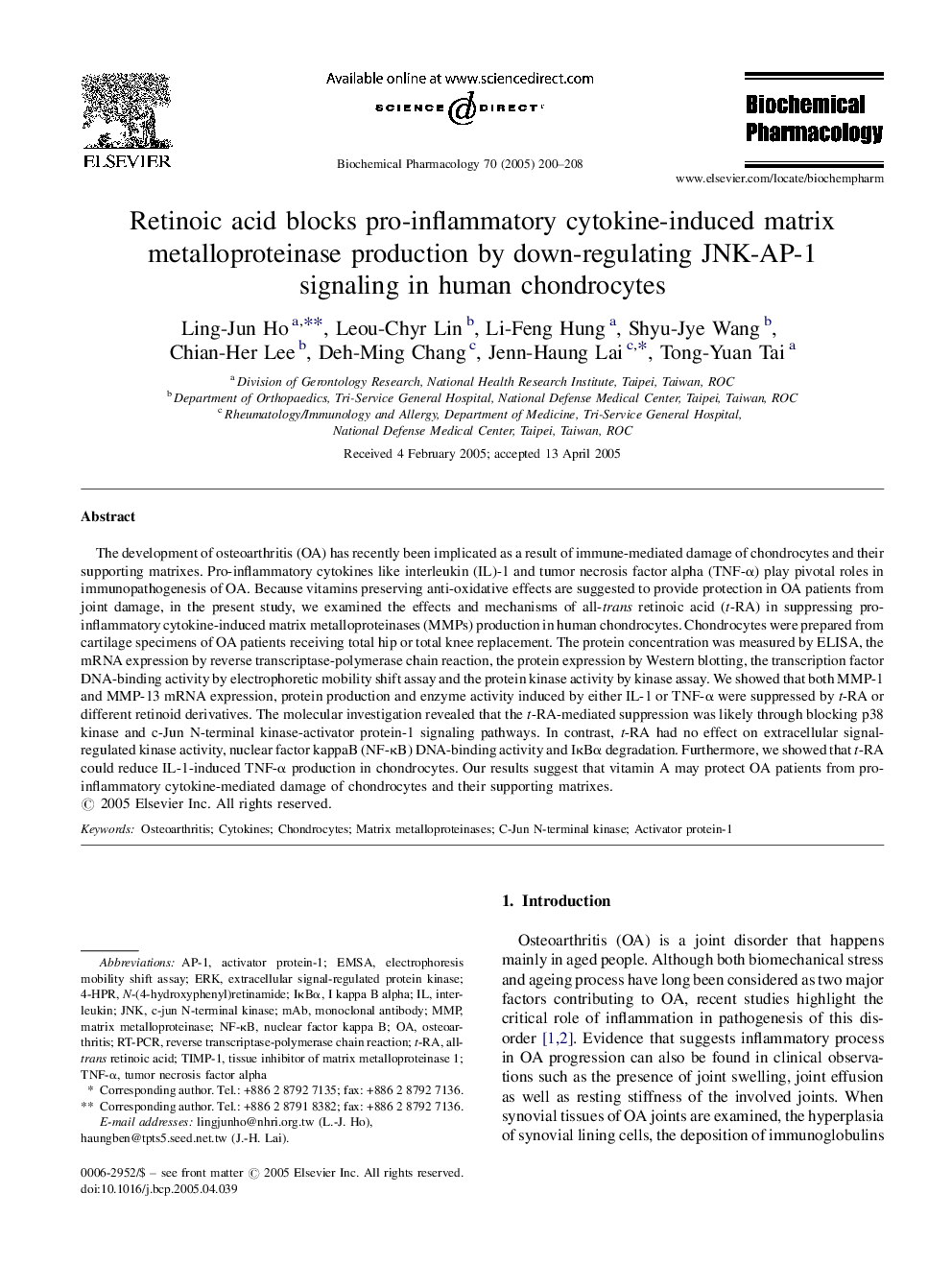| کد مقاله | کد نشریه | سال انتشار | مقاله انگلیسی | نسخه تمام متن |
|---|---|---|---|---|
| 9001912 | 1118563 | 2005 | 9 صفحه PDF | دانلود رایگان |
عنوان انگلیسی مقاله ISI
Retinoic acid blocks pro-inflammatory cytokine-induced matrix metalloproteinase production by down-regulating JNK-AP-1 signaling in human chondrocytes
دانلود مقاله + سفارش ترجمه
دانلود مقاله ISI انگلیسی
رایگان برای ایرانیان
کلمات کلیدی
ERKt-RAEMSATIMP-1IκBαAP-1RT-PCRmAbJnkNF-κBMMP4-HPR - 4 HPRc-Jun N-terminal kinase - C-Jun N-terminal kinaseN-(4-Hydroxyphenyl)retinamide - N- (4-هیدروکسی فنیل) رتینامینیدelectrophoresis mobility shift assay - آزمایش تحرک تحرک الکتروفورزall-trans retinoic acid - آل – ترانس رتینوئیک اسیدMonoclonal antibody - آنتی بادی مونوکلونالOsteoarthritis - استئوآرتریت(آرتروز)interleukin - اینترلوکینtumor necrosis factor alpha - تومور نکروز عامل آلفاCytokines - سیتوکین هاTNF-α - فاکتور نکروز توموری آلفاnuclear factor kappa B - فاکتور هسته ای کاپا Bmatrix metalloproteinase - ماتریکس متالوپروتئینازMatrix metalloproteinases - متالوپروتئیناز ماتریکسReverse transcriptase-polymerase chain reaction - واکنش زنجیره ای واکنش زنجیره ای واکنش زنجیره ایactivator protein-1 - پروتئین فعال کننده-1Extracellular signal-regulated protein kinase - پروتئین کیناز کنترل شده سیگنال غیر سلولیChondrocytes - کندروسیت
موضوعات مرتبط
علوم پزشکی و سلامت
داروسازی، سم شناسی و علوم دارویی
داروشناسی
پیش نمایش صفحه اول مقاله

چکیده انگلیسی
The development of osteoarthritis (OA) has recently been implicated as a result of immune-mediated damage of chondrocytes and their supporting matrixes. Pro-inflammatory cytokines like interleukin (IL)-1 and tumor necrosis factor alpha (TNF-α) play pivotal roles in immunopathogenesis of OA. Because vitamins preserving anti-oxidative effects are suggested to provide protection in OA patients from joint damage, in the present study, we examined the effects and mechanisms of all-trans retinoic acid (t-RA) in suppressing pro-inflammatory cytokine-induced matrix metalloproteinases (MMPs) production in human chondrocytes. Chondrocytes were prepared from cartilage specimens of OA patients receiving total hip or total knee replacement. The protein concentration was measured by ELISA, the mRNA expression by reverse transcriptase-polymerase chain reaction, the protein expression by Western blotting, the transcription factor DNA-binding activity by electrophoretic mobility shift assay and the protein kinase activity by kinase assay. We showed that both MMP-1 and MMP-13 mRNA expression, protein production and enzyme activity induced by either IL-1 or TNF-α were suppressed by t-RA or different retinoid derivatives. The molecular investigation revealed that the t-RA-mediated suppression was likely through blocking p38 kinase and c-Jun N-terminal kinase-activator protein-1 signaling pathways. In contrast, t-RA had no effect on extracellular signal-regulated kinase activity, nuclear factor kappaB (NF-κB) DNA-binding activity and IκBα degradation. Furthermore, we showed that t-RA could reduce IL-1-induced TNF-α production in chondrocytes. Our results suggest that vitamin A may protect OA patients from pro-inflammatory cytokine-mediated damage of chondrocytes and their supporting matrixes.
ناشر
Database: Elsevier - ScienceDirect (ساینس دایرکت)
Journal: Biochemical Pharmacology - Volume 70, Issue 2, 15 July 2005, Pages 200-208
Journal: Biochemical Pharmacology - Volume 70, Issue 2, 15 July 2005, Pages 200-208
نویسندگان
Ling-Jun Ho, Leou-Chyr Lin, Li-Feng Hung, Shyu-Jye Wang, Chian-Her Lee, Deh-Ming Chang, Jenn-Haung Lai, Tong-Yuan Tai,